If your dog has tried peanut butter, it must have been love at first bite! Dogs and peanut butter love affair is a tale as old as time! Ok, maybe not that long, but it is undoubtedly a classic combo.
We still did not find a dog that does not utterly enjoy licking peanut butter off a spoon. Peanut butter is not toxic to our canine friends, but they, too, can be allergic to peanuts just like humans. If your pet has that problem, you can try an alternative.
There are numerous nut kinds of butter available on the market today. How can you know which is safe to feed your pet?
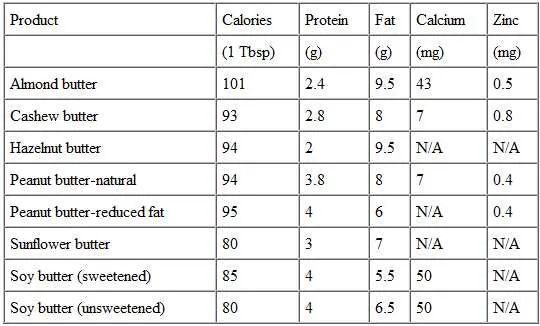
We are here to help, as always. We’ll start with almond butter!
Almond butter is an excellent peanut butter alternative due to its similar texture and flavor and almost identical calorie, fat, and protein content. Some even believe it is healthier due to its high fiber content and the fact it is rich in vitamins and minerals.
If you want to find out the answer to the question can dogs eat peanut butter and whether it is beneficial for them, stay with us to the very end!
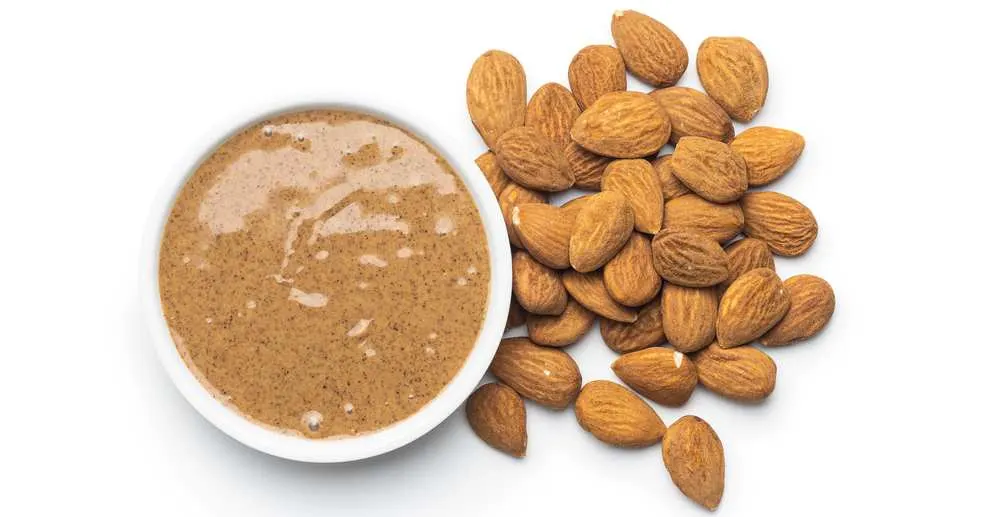
Almond Butter Defined
Almond butter is a delicious spread you can buy at the store or make on your own. We suggest that you do the latter. It is super easy to do it yourself, and far better both taste and health-wise.
How To Make Almond Butter?
Our recipe has only one ingredient – almonds. We do not add any oils. It only takes a couple of minutes of your precious time to make too.
You will need a powerful blender if you want the process to be speedy, but you can also do it in the food processor if you already own it and do not want to invest in new kitchen appliances. It will take a bit longer, though, but the results will be almost the same.
Our almond butter is rich and creamy. If you do everything right, you too can enjoy a super smooth almond butter at the comfort of your home whenever you feel like it.
Here is the step-by-step guide:
- Place raw almonds on a baking sheet (about four cups)
- Roast them for a couple of minutes until they release their natural oils and then let them cool to the room temperature
- Blend almonds into a smooth almond butter
These three simple steps are all that stand in the way of you and potentially your pet enjoying delicious almond butter. It is easy – give it a try!
What if you fail and you get flaky butter? It might be that you need to roast the almonds for a few minutes more, but sometimes it is not even your fault – some almonds are simply that way! The good news is that you can totally salvage the situation by adding a spoon or two of oil until your almond butter turns creamy.
Extra Tip: It is best not to reduce the number of almonds and stick to a minimum of 4 cups, especially when using a blender. Less than that will make the blades struggle.
If you are in a hurry, you can even skip the roasting and add a couple of tablespoons of any neutral-tasting oil you have around in your kitchen. Set your blender on high speed and, if needed, use the tamper to push down the almonds to speed up the process. It will take only a minute or so!
Alternatively, you can use pre-roasted almonds too, but they also call for added oils. Only freshly roasted almonds will release enough natural oils to be blended on their own.
How To Properly Store Almond Butter?
It is best to keep the almond butter in your fridge. Any nut butter can go rancid rather quickly due to the oils naturally present in it.
If you refrigerate it as soon as you make it or open the store-bought jar, the almond butter should stay good for several weeks or even longer.
It is best to keep it in an air-tight container and always use a clean spoon!
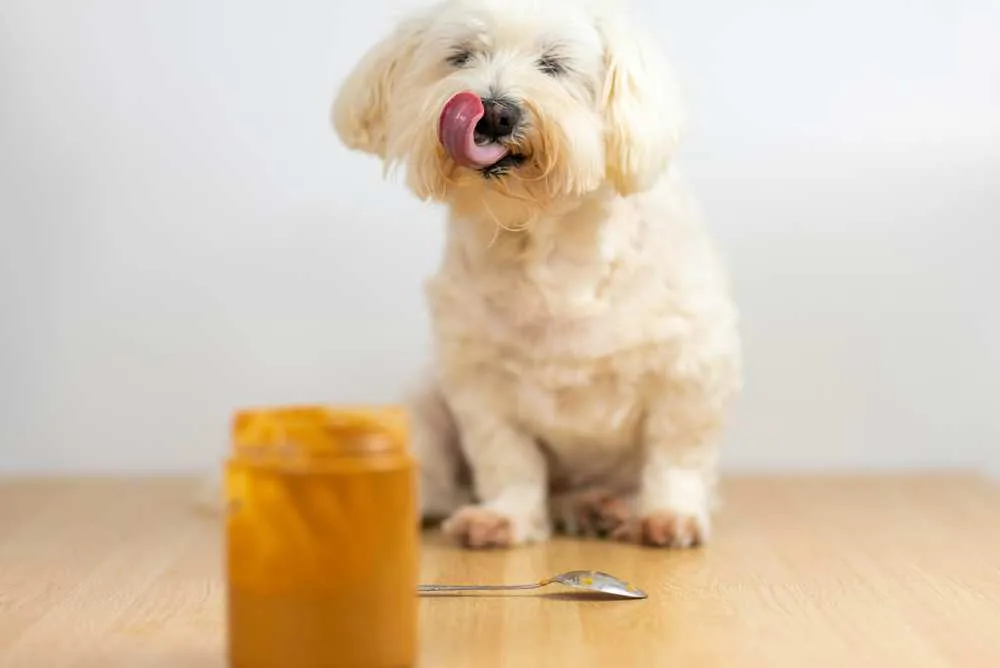
Can Dogs Eat Almond Butter?
Yes, when eaten in moderation, almond butter is perfectly safe for our canine best friends. There is even more good news. Namely, peanuts are a legume, and that means that they can often cause allergies in both humans and dogs.
On the other hand, almonds are tree nuts, and if your dog is allergic to peanuts, it may not be allergic to tree nuts too. Therefore, you can simply substitute the peanut butter with almond butter.
Of course, always start slow whenever introducing a new item into your dog’s diet. Let your dog have a lick of almond butter and observe him or her for any unwanted reaction. Even if your pet is not allergic to nuts, he or she can still have some digestion issues. Not all canines can digest nuts well.

Is Almond Butter Beneficial For Your Dog?
Once you are 100% sure that your dog tolerates almond butter, you can introduce it as a regular treat every couple of days. There are a few benefits it can bring to your pooch, and those are:
- A shinier coat
- Healthy eyes
- Better liver functioning
- Decreased cancer risk
- Stronger immunity
- Healthy bones and joints
All this is due to the high content of beneficial vitamins such as vitamin B3, and vitamin E. Vitamin E is a well-known antioxidant that fights free radicals in the body, making your dog more resistant to many known diseases, including cancer. As a bonus, almonds are also rich in both calcium and phosphorus.
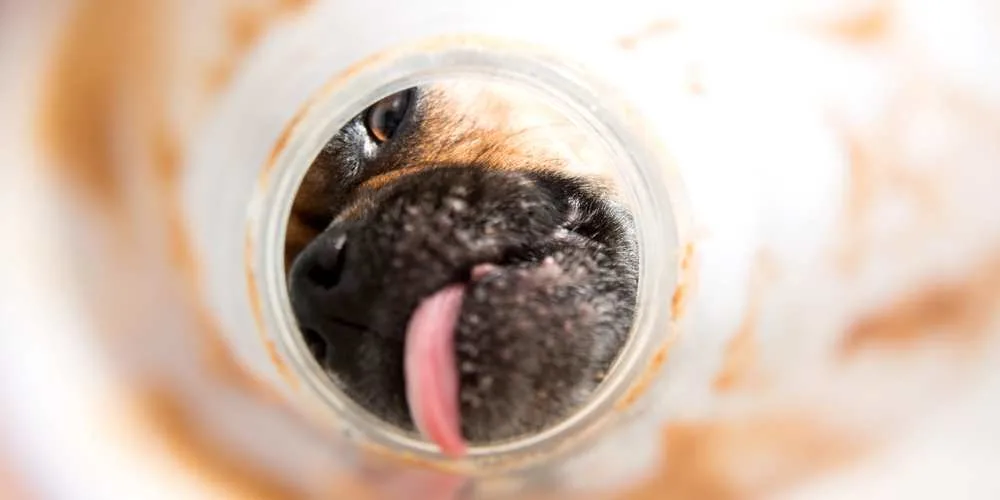
How To Choose The Best Almond Butter For Your Pet?
As you can already assume, it is best to make homemade almond butter from fresh unsalted almonds. Many brands sold in stores have additional ingredients that are not good for your furry friends such as salt, sugar, honey, and some oils. Even the stores that sell freshly ground almond butter often add sweeteners.
The added ingredients only make the almond butter more challenging to digest but can even make your pet sick. Sugar is especially problematic for diabetic dogs.
Xylitol is an artificial sweetener that is often found on the ingredients list and is even more dangerous than sugar. Dogs are highly sensitive to this substance. In fact, ingesting too much Xylitol can actually kill your four-legged pet.
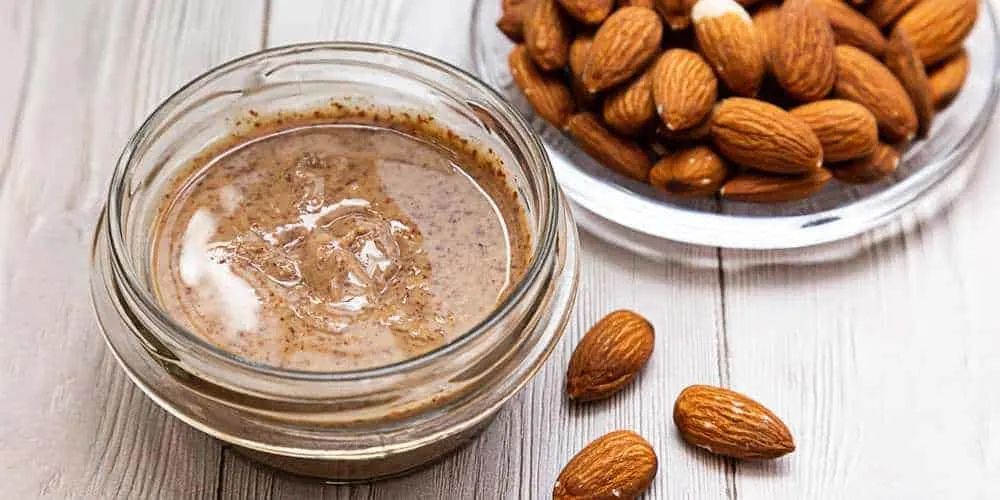
What Are the Possible Side Effects of Dog Eating Almond Butter?
We have already warned you that eating too much almond butter can cause your pet to experience digestive issues or even some more severe health problems. Here are the possible side effects that occur when almond butter is not given in moderation:
- Upset Stomach: Not all dogs can digest almonds well, and if they overeat them, they will surely end up with an upset stomach.
- Diarrhea: The sensitive dogs that eat too much almond butter often get diarrhea. If that happens to your dog, it is best to feed him or her a bland diet until the stomach settles. Also, make sure you increase the number of fluids until he or she recovers.
- Vomiting: Another side effect of eating more almond butter than your pet’s body can handle is vomiting. Once again, a bland diet and adequate hydration will help.
- Weight Gain: Being high in fat and calories, almond butter can lead to weight gain. If it is sweetened, then things can get bad pretty quickly. Never give your pet almond butter as a whole meal. It should be given in small portions and only occasionally. Consider it a treat or a snack, and that should prevent excessive weight gain.
What If Your Pet Eats Too Much Almond Butter?
Sometimes our dogs can be mischievous like kids. If your dog somehow gets its paws on an open jar or almond butter while you are not looking, he or she will empty it in a blink of an eye. Funny as it can seem, this type of situation is hazardous as well.
The side effects we have mentioned might not seem dangerous, but sometimes things take a turn for the worse, and you have to seek medical attention. If your pet has an upset stomach, GI distress, or vomits – try to help him on your own. Still, if the problem persists and lasts longer than 48 hours, you need to take your canine friend to the vet.
If your pet has an allergic reaction, go to the vet right away. If the vet’s office is closed, contact animal poison control or head for the emergency vet’s office.
Learn More: What Can Dogs Eat? A Comprehensive List Of Dog-safe Foods


